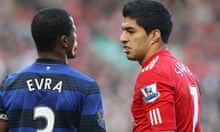It is one of those reports that brings to mind the old phrase about not leaving a stone unturned. The thoroughness, attention to detail and remarkable depth of the 115-page document produced by the Football Association's independent commission and published by the governing body on Saturday night will have provided some uncomfortable bedtime reading for Luis Suárez and Liverpool Football Club over the weekend.
It is little wonder that Liverpool have said that they need time to "read and digest and properly consider the contents" before making further comment on a report that has prompted legal experts to talk about a document that is "appeal proof". Paul Goulding QC, the chairman of the three-man panel that found Suárez guilty of racially abusing the Manchester United defender Patrice Evra in October last year, has brought a new meaning to the word transparency by revealing every last detail from the moment the two players clashed at Anfield to the day that the Uruguayan was given an eight-match ban and fined £40,000 – as well as every spit and cough in between.
Liverpool reacted angrily to the verdict when it was announced a little under two weeks ago, issuing a statement in which they referred to unfounded accusations that Evra had made in the past and described the full-back as "not credible". The commission, however, paints a rather different picture of the player who made the allegations. "In all the circumstances, we preferred the evidence of Mr Evra. His account was clear and consistent in all material respects. There is no basis for saying that he lied or was mistaken in what he heard," the report says.
The words are nothing like as complimentary when it comes to Suárez. The commission found that Suárez used the word "negro" or "negros" seven times during the flashpoint with Evra in the second half of the 1-1 draw and described the Uruguayan's evidence as "unreliable in relation to matters of critical importance", highlighting "inconsistencies between his accounts given at different times as to what happened".
Suárez's claims that he pinched Evra's skin in an attempt to defuse the row in the Liverpool goalmouth and that his use of the word "negro" to address his opponent was conciliatory and friendly were rejected out of hand. "To describe his own behaviour in that way was unsustainable and simply incredible given that the players were engaged in an acrimonious argument. That this was put forward by Mr Suárez was surprising and seriously undermined the reliability of his evidence on other matters," the report says.
It was established, by Evra's own admission, that the Frenchman had started the verbal exchange when he reacted angrily to a foul by Suárez five minutes earlier. Evra addressed Suárez with the phrase "Concha de tu hermana", literally an obscene term referring to Suárez's sister but one which is commonly used in Spanish as an exclamation. Although Suárez did not hear that remark, both players agreed Evra then said: "Why did you kick me?" Thereafter there are conflicting accounts of what happened. Evra claimed that Suárez responded by saying: "Because you are black". Suárez claimed he had replied: "It was a normal foul."
In the next alleged exchange, Evra said he responded by saying: "Say it to me again, I'm going to punch you." And Suárez replied: "I don't speak to blacks." Suárez's representative, Peter McCormick, alleged that Evra had invented that comment to take revenge on Suárez for refusing to apologise for fouling him, an argument the commission dismissed.
The third exchange alleged by Evra was that he said: "OK, now I think I'm going to punch you." To which Suárez replied, "Dale, negro, negro, negro", meaning "OK, blackie, blackie, blackie". Suárez disputed this was the case and claimed that he only said "negro" once during his confrontation with Evra, which was when the United player was alleged to have said "Don't touch me South American", when the referee, Andre Marriner, blew his whistle to stop the corner being taken. Suárez said that it was used in a way that was not intended to be racially offensive when he replied: "Por que, negro," meaning "Why, black?"
The commission, however, found several holes in this argument. Although it was accepted that "negro" could have a different meaning in Uruguay and Latin America in certain situations and that Suárez himself had used it on previous occasions in a friendly way, the experts that the FA instructed to prepare a written report on the linguistic and cultural interpretations of the words "negro and negros" in Rioplatense Spanish, told the commission "that if Mr Suárez said the things that Mr Evra alleged, they would be considered racially offensive in Uruguay and other regions of Latin America", not least because of the acrimonious context in which they occurred.
The fact that those who came forward to support Suárez were also inconsistent hardly helped Liverpool's case. While Suárez claimed that he said to Evra: "Por que, negro" – meaning "Why black?" – Damien Comolli, Liverpool's director of football, who spoke to Suárez immediately after the game, and Dirk Kuyt, the Liverpool midfielder who also had a conversation with his team-mate afterwards, both said initially in their interviews with the FA that Suárez's words translated as "because you are black". Comolli later claimed that he misheard what Suárez said in Spanish, and Kuyt said that he misheard what Suárez said in Dutch, leading to them both changing their words to tally with Suárez's version when it came to providing their witness statements.
There were couple of inconsistencies in Evra's accounts but, overall, the commission accepted his account of the exchanges because he was "a credible witness" and his "evidence was not seriously undermined in any material respect".
Once the commission established that the FA charge against Suárez was proved, the automatic two-match suspension for using insulting words was increased to four because of the racial element. "Aggravating factors" were then considered, including the number of times Suárez used the word "negro" or "negros"; the context in which the words were used; the fact that the FA has promoted campaigns to root out racism and that the words were targeted at a particular black player.
The mitigating factors included Suárez's previous clean record in relation to charges of this type; the fact that Evra started the confrontation in the goalmouth; the personal embarrassment Suárez would face in the wake of the decision; the player's charitable work with a football project in South Africa and his vow to never use the word "negro" on a football pitch in England again.
The report reveals that both shorter and longer bans were considered before the commission "concluded that an eight-match suspension was appropriate". In between now and then Suárez has received the full backing of his club, Kenny Dalglish, the manager, and the players. The Suárez T-shirts worn by the Liverpool players and Dalglish before the Wigan match last month were seen as a show of solidarity. Whether they still believe the verdict can be overturned in the wake of this extraordinary report remains to be seen.



